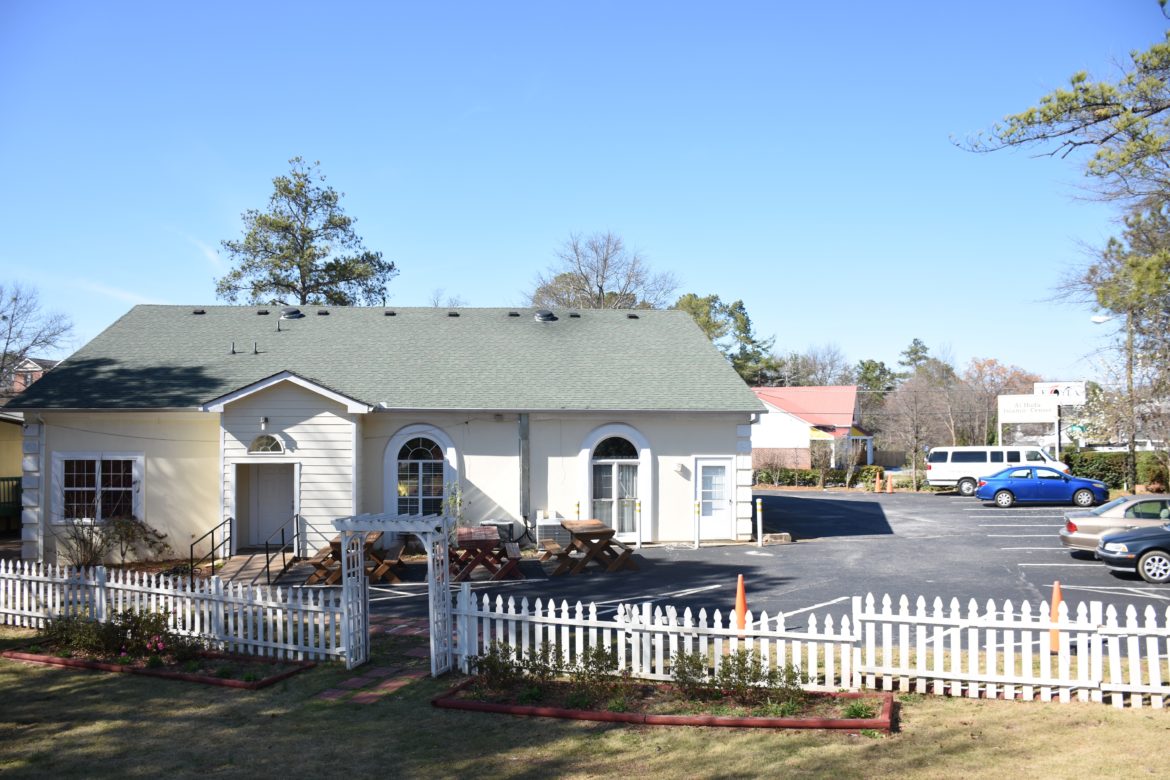The Al-Huda Islamic Center of Athens, located at 2022 S. Milledge Ave., is the place of worship for the Muslim community in Athens, Ga. According to imam and University of Georgia professor Adel Amer, the mosque is an open space where community members are welcome to ask questions. “We are one of the communities that’s been kind of targeted in a way and people have questions that we had to answer,” Amer said. “We opened the doors of our mosque to answer all the questions of our fellow Americans.” Photo by Zoe Peterson.
By VALERIA GARCIA-POZO – News Editor
In light of President Donald Trump’s recent actions, which have been considered to be discriminatory to Muslims by many, members of the Athens community reflect on the impact of Islamophobia.
On Jan. 27, President Donald Trump signed an executive order that halted all immigrants and visa holders from seven countries with majority Muslim populations from entering the United States for 90 days. Trump’s executive order also banned refugee admissions for 120 days and Syrian refugees indefinitely.
Although this order was called “Protecting the Nation From Terrorist Attacks by Foreign Nationals”, some perceive it to be Islamophobic in nature. According to the University of California Berkeley’s Center for Race and Gender, Islamophobia is “unfounded hostility towards Muslims, and therefore fear or dislike of all or most Muslims.”
“Islamophobia is a phenomenon that people build up through time because of the media, and I would point my finger directly to the media because in the media world, they say when it bleeds, it leads,” Adel Amer, Al-Huda Islamic Center imam and UGA professor, said. “It’s a double-edged knife that has a pretty bad consequences on the societal fabric of the U.S.”
Despite the fact that there has been a temporary restraining order placed on the executive order, controversial pieces of legislation such as this one have brought to light the issue of Islamophobia to communities across the country. Athens is one such community.
“The (mosque) has been here since 1987,” Amer said. “Ever since, the community’s growing and growing and growing, and this is the only mosque in a 50-mile radius. It’s also connected with the MSA, which is the Muslim Student Association at UGA, and it serves all the students that come from different places, like Columbus, like Marietta, like Savannah.”
The Al-Huda Islamic Center of Athens, Clarke Central High School and UGA.
Senior Safwan Bhuiyan, a Muslim, believes it is important to take pride in one’s religion and feels free to practice Islam in Athens, although he acknowledges the fear onset by such a legislation.
“I think it’s very important for people to know that you’re Muslim and you should not be afraid of it,” Bhuiyan said. “I feel a little scared, and I think every person that Trump has targeted is gonna be scared.”
English department co-chair Ian Altman likewise recognizes that the liberal nature of Athens helps to make the Muslim community feel accepted, but believes that lack of knowledge is still a persistent issue.
“I don’t think that Athens, Ga. has quite the same problem that many other communities in the U.S. have, but certainly there is a lot of ignorance here. I mean, I think a lot of people likely don’t know the difference, for example, between Shia and Sunni, and have no idea what Sufis are,” Altman said. “I think that it’s up to not only our Muslim citizens, but also those who support them who honor them for the human beings that they are, to make others aware that they’re not bringing any harm here.”
Despite feeling generally accepted, Bhuiyan recalls instances during which this lack of knowledge regarding his religion translated into offensive actions.
“I remember when my sister was in middle school and I was in elementary school, there was this one kid that pulled her hijab off because — he just went up to her and just like, pulled her hijab off,” Bhuiyan said. “My sister was like, ‘What? I didn’t know people could go this far.’ So, I think she was the most disturbed by it.”
Amer believes that the way to combat Islamophobia is through open communication and willingness to learn.
“We need to build the bridges. We build the bridges, and we ask people to cross the bridge and take the extra mile in order to know, because at the end of the day, I will be an enemy of what I don’t know,” Amer said. “Learning, teaching and education and fighting ignorance is our way to get people to know who we are and what we’re standing for and what Islam’s all about.”
According to Amer, events, such as the open house that took place at Al-Huda Islamic Center on Feb. 4, aid in clearing up misconceptions that community members may have regarding the religion.
“Athens is a wonderful place to live in and people are very understanding and actually, they are very supportive and the evidence is so clear,” Amer said. “We had a wonderful open house. More than one thousand people showed up. It was very successful.”
Bhuiyan encourages members of his community to engage in interactions with one another to build a better understanding.
“I think my community could be more outreached, like going to different community events in Athens to like, help their community. The mosque over there is kinda secluded, so I’d like them to go out and talk to people. Just show them that, ‘Oh, we’re Muslim. We’re good people. Come talk to us,’” Bhuiyan said. “I’m saying, go out, come to the local mosque, and just socialize.”
